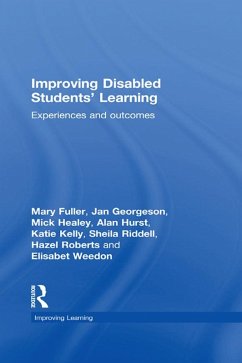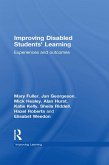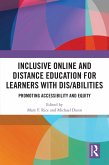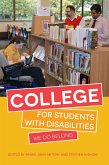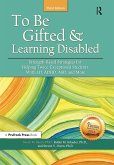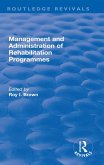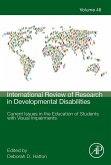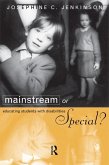Mary Fuller, Jan Georgeson, Mick Healey, Alan Hurst, Katie Kelly, Sheila Riddell, Hazel Roberts, Elisabet Weedon
Improving Disabled Students' Learning (eBook, ePUB)
Experiences and Outcomes
43,95 €
43,95 €
inkl. MwSt.
Sofort per Download lieferbar

22 °P sammeln
43,95 €
Als Download kaufen

43,95 €
inkl. MwSt.
Sofort per Download lieferbar

22 °P sammeln
Jetzt verschenken
Alle Infos zum eBook verschenken
43,95 €
inkl. MwSt.
Sofort per Download lieferbar
Alle Infos zum eBook verschenken

22 °P sammeln
Mary Fuller, Jan Georgeson, Mick Healey, Alan Hurst, Katie Kelly, Sheila Riddell, Hazel Roberts, Elisabet Weedon
Improving Disabled Students' Learning (eBook, ePUB)
Experiences and Outcomes
- Format: ePub
- Merkliste
- Auf die Merkliste
- Bewerten Bewerten
- Teilen
- Produkt teilen
- Produkterinnerung
- Produkterinnerung

Bitte loggen Sie sich zunächst in Ihr Kundenkonto ein oder registrieren Sie sich bei
bücher.de, um das eBook-Abo tolino select nutzen zu können.
Hier können Sie sich einloggen
Hier können Sie sich einloggen
Sie sind bereits eingeloggt. Klicken Sie auf 2. tolino select Abo, um fortzufahren.

Bitte loggen Sie sich zunächst in Ihr Kundenkonto ein oder registrieren Sie sich bei bücher.de, um das eBook-Abo tolino select nutzen zu können.
This book shows how disabled students experience university life. Crucially, it foregrounds the views of disabled students themselves, giving rise to a complex, contradictory and fascinating picture of university life.
- Geräte: eReader
- mit Kopierschutz
- eBook Hilfe
- Größe: 2.22MB
Andere Kunden interessierten sich auch für
![Improving Disabled Students' Learning (eBook, PDF) Improving Disabled Students' Learning (eBook, PDF)]() Mary FullerImproving Disabled Students' Learning (eBook, PDF)43,95 €
Mary FullerImproving Disabled Students' Learning (eBook, PDF)43,95 €![Inclusive Online and Distance Education for Learners with Dis/abilities (eBook, ePUB) Inclusive Online and Distance Education for Learners with Dis/abilities (eBook, ePUB)]() Inclusive Online and Distance Education for Learners with Dis/abilities (eBook, ePUB)40,95 €
Inclusive Online and Distance Education for Learners with Dis/abilities (eBook, ePUB)40,95 €![College for Students with Disabilities (eBook, ePUB) College for Students with Disabilities (eBook, ePUB)]() College for Students with Disabilities (eBook, ePUB)21,95 €
College for Students with Disabilities (eBook, ePUB)21,95 €![To Be Gifted and Learning Disabled (eBook, ePUB) To Be Gifted and Learning Disabled (eBook, ePUB)]() Susan M. BaumTo Be Gifted and Learning Disabled (eBook, ePUB)28,95 €
Susan M. BaumTo Be Gifted and Learning Disabled (eBook, ePUB)28,95 €![Management and Administration of Rehabilitation Programmes (eBook, ePUB) Management and Administration of Rehabilitation Programmes (eBook, ePUB)]() Management and Administration of Rehabilitation Programmes (eBook, ePUB)33,95 €
Management and Administration of Rehabilitation Programmes (eBook, ePUB)33,95 €![Current Issues in the Education of Students with Visual Impairments (eBook, ePUB) Current Issues in the Education of Students with Visual Impairments (eBook, ePUB)]() Current Issues in the Education of Students with Visual Impairments (eBook, ePUB)138,95 €
Current Issues in the Education of Students with Visual Impairments (eBook, ePUB)138,95 €![Mainstream or Special? (eBook, ePUB) Mainstream or Special? (eBook, ePUB)]() Josephine JenkinsonMainstream or Special? (eBook, ePUB)54,95 €
Josephine JenkinsonMainstream or Special? (eBook, ePUB)54,95 €-
-
-
This book shows how disabled students experience university life. Crucially, it foregrounds the views of disabled students themselves, giving rise to a complex, contradictory and fascinating picture of university life.
Dieser Download kann aus rechtlichen Gründen nur mit Rechnungsadresse in A, B, BG, CY, CZ, D, DK, EW, E, FIN, F, GR, HR, H, IRL, I, LT, L, LR, M, NL, PL, P, R, S, SLO, SK ausgeliefert werden.
Produktdetails
- Produktdetails
- Verlag: Taylor & Francis eBooks
- Seitenzahl: 224
- Erscheinungstermin: 13. Mai 2013
- Englisch
- ISBN-13: 9781136033988
- Artikelnr.: 38446693
- Verlag: Taylor & Francis eBooks
- Seitenzahl: 224
- Erscheinungstermin: 13. Mai 2013
- Englisch
- ISBN-13: 9781136033988
- Artikelnr.: 38446693
- Herstellerkennzeichnung Die Herstellerinformationen sind derzeit nicht verfügbar.
Mary Fuller is Professor of Education at the University of Gloucestershire and Director of the research project on which this book is based. She has worked as lecturer and researcher at the universities of Bath, Bristol, Reading and Oxford. Her research interests are in gender, race and disability in educational settings, areas in which she has published extensively.
Jan Georgeson is Senior Lecturer in Early Years Professional Status at the University of Chichester. She has worked on a variety of research projects investigating disability and disadvantage, with particular interests in organizational structure, interactional style and sociocultural approaches to pedagogy.
Mick Healey is Director of Centre for Active Learning, University of Gloucestershire. He is internationally known for his research into teaching and learning in higher education. He is a National Teaching Fellow and a Senior Fellow of the HE Academy.
Alan Hurst is a trustee of Skill: National Bureau for Students with Disabilities. He has published books and articles, lectured and led workshops on disability in higher education in many countries. He has also worked with government agencies to develop and monitor policy and provision for disabled students.
Katie Kelly received a first degree at the University of Gloucestershire and after working in a disability rights organization was Research Assistant to this project, focussing on data gathering for the student case studies. She has returned to working in the voluntary sector.
Sheila Riddell is Director, Centre for Research in Education Inclusion and Diversity, University of Edinburgh. Her research interests include: equality and social inclusion, with particular reference to gender, social class and disability in education, training, employment and social care. She has published extensively in these areas and sits on policy advisory committees on disability and equal rights.
Hazel Roberts has a research studentship at the University of Gloucestershire. Her doctoral thesis investigates the role of support workers in the learning of disabled students in higher education. She has worked as a researcher on the project on which this book is based.
Elisabet Weedon is Deputy Director, Centre for Research in Education Inclusion and Diversity, University of Edinburgh. Her main research interests are in the area of adult learning. She is currently researching lifelong learning in Europe and learning in the workplace and has published research in this area.
Jan Georgeson is Senior Lecturer in Early Years Professional Status at the University of Chichester. She has worked on a variety of research projects investigating disability and disadvantage, with particular interests in organizational structure, interactional style and sociocultural approaches to pedagogy.
Mick Healey is Director of Centre for Active Learning, University of Gloucestershire. He is internationally known for his research into teaching and learning in higher education. He is a National Teaching Fellow and a Senior Fellow of the HE Academy.
Alan Hurst is a trustee of Skill: National Bureau for Students with Disabilities. He has published books and articles, lectured and led workshops on disability in higher education in many countries. He has also worked with government agencies to develop and monitor policy and provision for disabled students.
Katie Kelly received a first degree at the University of Gloucestershire and after working in a disability rights organization was Research Assistant to this project, focussing on data gathering for the student case studies. She has returned to working in the voluntary sector.
Sheila Riddell is Director, Centre for Research in Education Inclusion and Diversity, University of Edinburgh. Her research interests include: equality and social inclusion, with particular reference to gender, social class and disability in education, training, employment and social care. She has published extensively in these areas and sits on policy advisory committees on disability and equal rights.
Hazel Roberts has a research studentship at the University of Gloucestershire. Her doctoral thesis investigates the role of support workers in the learning of disabled students in higher education. She has worked as a researcher on the project on which this book is based.
Elisabet Weedon is Deputy Director, Centre for Research in Education Inclusion and Diversity, University of Edinburgh. Her main research interests are in the area of adult learning. She is currently researching lifelong learning in Europe and learning in the workplace and has published research in this area.
PART 1 WHAT IS THE ISSUE WITH DISABLED STUDENTS' LEARNING? 1. Introduction
PART 2: WHAT OUR RESEARCH STUDY TELLS US 2. Managerialism and equalities:
tensions within widening access policy and practice for disabled students
in UK universities 3. Listening to disabled students on teaching, learning
and reasonable adjustments 4. Assessing disabled students: student and
staff experiences of reasonable adjustments 5. Curriculum and pedagogy:
challenges and dilemmas for teaching staff 6. Identity work: ways of being
a disabled student in higher education 7. The idea of fitness to practise:
discourses of disability and the negotiation of identity in initial teacher
training 8. Troublesome transitions? Disabled students' entry into and
journey through higher education 9. Organizational structures for
disability support: contradictions as catalysts for change PART 3: WHAT ARE
THE IMPLICATIONS OF OUR STUDY OF DISABLED STUDENTS' EXPERIENCES? 10.
Reflections and conclusions
PART 2: WHAT OUR RESEARCH STUDY TELLS US 2. Managerialism and equalities:
tensions within widening access policy and practice for disabled students
in UK universities 3. Listening to disabled students on teaching, learning
and reasonable adjustments 4. Assessing disabled students: student and
staff experiences of reasonable adjustments 5. Curriculum and pedagogy:
challenges and dilemmas for teaching staff 6. Identity work: ways of being
a disabled student in higher education 7. The idea of fitness to practise:
discourses of disability and the negotiation of identity in initial teacher
training 8. Troublesome transitions? Disabled students' entry into and
journey through higher education 9. Organizational structures for
disability support: contradictions as catalysts for change PART 3: WHAT ARE
THE IMPLICATIONS OF OUR STUDY OF DISABLED STUDENTS' EXPERIENCES? 10.
Reflections and conclusions
PART 1 WHAT IS THE ISSUE WITH DISABLED STUDENTS' LEARNING? 1. Introduction
PART 2: WHAT OUR RESEARCH STUDY TELLS US 2. Managerialism and equalities:
tensions within widening access policy and practice for disabled students
in UK universities 3. Listening to disabled students on teaching, learning
and reasonable adjustments 4. Assessing disabled students: student and
staff experiences of reasonable adjustments 5. Curriculum and pedagogy:
challenges and dilemmas for teaching staff 6. Identity work: ways of being
a disabled student in higher education 7. The idea of fitness to practise:
discourses of disability and the negotiation of identity in initial teacher
training 8. Troublesome transitions? Disabled students' entry into and
journey through higher education 9. Organizational structures for
disability support: contradictions as catalysts for change PART 3: WHAT ARE
THE IMPLICATIONS OF OUR STUDY OF DISABLED STUDENTS' EXPERIENCES? 10.
Reflections and conclusions
PART 2: WHAT OUR RESEARCH STUDY TELLS US 2. Managerialism and equalities:
tensions within widening access policy and practice for disabled students
in UK universities 3. Listening to disabled students on teaching, learning
and reasonable adjustments 4. Assessing disabled students: student and
staff experiences of reasonable adjustments 5. Curriculum and pedagogy:
challenges and dilemmas for teaching staff 6. Identity work: ways of being
a disabled student in higher education 7. The idea of fitness to practise:
discourses of disability and the negotiation of identity in initial teacher
training 8. Troublesome transitions? Disabled students' entry into and
journey through higher education 9. Organizational structures for
disability support: contradictions as catalysts for change PART 3: WHAT ARE
THE IMPLICATIONS OF OUR STUDY OF DISABLED STUDENTS' EXPERIENCES? 10.
Reflections and conclusions
